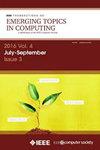Online Resource Provisioning and Batch Scheduling for AIoT Inference Serving in an XPU Edge Cloud
IF 5.1
2区 计算机科学
Q1 COMPUTER SCIENCE, INFORMATION SYSTEMS
IEEE Transactions on Emerging Topics in Computing
Pub Date : 2024-03-30
DOI:10.1109/TETC.2024.3403874
引用次数: 0
Abstract
Driven by the accelerated convergence of artificial intelligence (AI) and the Internet of Things (IoT), the recent years have witnessed the booming of在 XPU 边缘云中为人工智能物联网推理服务进行在线资源调配和批量调度
近年来,在人工智能(AI)和物联网(IoT)加速融合的推动下,物联网人工智能(AIoT)蓬勃发展。边缘云将计算和服务能力置于网络边缘,以减少网络传输开销,已被广泛认为是AIoT应用的关键基础设施。同时,为了加速计算密集型的边缘云AI操作,GPU、NPU、TPU等专业AI加速器越来越多地集成到边缘云中。对于这种新兴的XPU边缘云,更有效地利用昂贵的XPU已经成为一个重大挑战。在本文中,我们提出了一个在线优化框架,用于联合资源配置和批调度,以便在XPU边缘云中更经济高效地进行AIoT推理服务。在线框架的核心优化过程是首先自适应批处理推理任务,在不影响服务水平协议(SLA)的前提下提高系统吞吐量。接下来,为批分配异构XPU资源。最后,将资源实例整合为最少的物理服务器。通过广泛的跟踪驱动仿真,我们验证了所提出的在线优化框架的性能。
本文章由计算机程序翻译,如有差异,请以英文原文为准。
求助全文
约1分钟内获得全文
求助全文
来源期刊

IEEE Transactions on Emerging Topics in Computing
Computer Science-Computer Science (miscellaneous)
CiteScore
12.10
自引率
5.10%
发文量
113
期刊介绍:
IEEE Transactions on Emerging Topics in Computing publishes papers on emerging aspects of computer science, computing technology, and computing applications not currently covered by other IEEE Computer Society Transactions. Some examples of emerging topics in computing include: IT for Green, Synthetic and organic computing structures and systems, Advanced analytics, Social/occupational computing, Location-based/client computer systems, Morphic computer design, Electronic game systems, & Health-care IT.
 求助内容:
求助内容: 应助结果提醒方式:
应助结果提醒方式:


